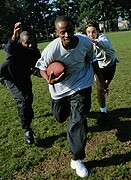
TUESDAY, Sept. 28 (HealthDay News) — American middle-school students who participate in team sports appear to be both physically and mentally better off than those who don’t, a new study suggests.
Researchers say the findings are the first to explore the potential health impact that team sports activity might have on pre-high school aged children, namely those between the ages of 12 and 14.
“Other studies have looked at older adolescents and consistently found a relationship between engaging in team sports and having a greater satisfaction in life and better self-reported health,” noted study co-author Keith Zullig, an associate professor of public health in the department of community medicine at West Virginia University in Morgantown.
“And here we found that, although we don’t know the exact cause and effect, it looks like the same thing is true for middle-school students,” Zullig said.
Zullig and co-author Rebecca J. White of the Philadelphia College of Osteopathic Medicine present their observations in the current online edition of the journal Applied Research in Quality of Life.
The study does not explore how participation in individual sports (such as gymnastics, tennis or golf) might affect the mental and physical health of young teens. Nor does it set out to distinguish between various types of team sports (such as basketball versus football) in terms of which might confer the greater health benefit.
But in 2005, the authors conducted a combined general physical activity and health perceptions survey of 245 seventh- and eighth-graders (primarily white) in two public school districts located in southwestern Ohio.
More than 90 percent of the teens said they were engaged in some form of “vigorous physical activity,” while 67 percent said they played team sports.
The students were then asked to describe their current level of satisfaction with their life, using categories ranging from “terrible” or “mostly dissatisfied” to “mostly satisfied” or “delighted.”
And finally all students were asked to describe their health, ranging from “excellent” to “poor.”
The research team found that vigorous activity alone offered no apparent benefit to the boys in how they rated their personal health or life satisfaction. Among girls, those who took part in vigorous activity said they were significantly more satisfied with their life, but did not feel their health was any better or worse as a result of such activity.
The connection between team sports activity and health was clearer. Among boys and girls, those who played on some team said they felt healthier and expressed more overall satisfaction with their life.
And boys who did not play any team sport were found to be five times more likely to say their physical health was “fair” or “poor” than those who were part of a team. Girls who didn’t participate in team sports were 30 times more likely than their team-playing cohorts to downgrade their health.
“But this has to be taken in context,” Zullig cautioned. “We don’t know specifically what is going on in sports that accounts for this. We think it has something to do with the team dynamic. But there are other variables that could play a role throughout. The level of competitiveness, for example, meaning if it’s at a higher level or if it’s recreation. And the intensity of the coach can also make a difference. So this is a pretty small sample, and there’s a lot more work to do to look at all these variables.”
James Roemmich, an associate professor of pediatrics and exercise and nutrition science at the State University of New York at Buffalo, said the findings appear to “make sense.”
“The advantage of being on a sports team is that there’s a sense of community and a lot of socialization that goes on,” he said. “And I think that would or could have a big influence on life satisfaction among young kids and people of all ages. You feel that you are part of something bigger.”
More information
For more on children and sports, visit the American Academy of Child & Adolescent Psychiatry.

